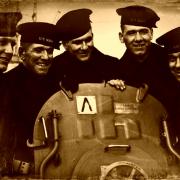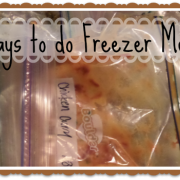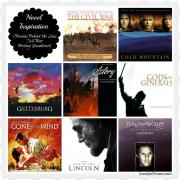It's Military Family Appreciation Month! How to Express Your Gratitude
Did you know that November is officially Military Family Appreciation Month? As a former military wife myself, I'm happy about this opportunity to recognize our brave men and women and their families. But what does it really mean? From Military.com:
Each year the President signs a proclamation declaring November Military Family Month. This annual proclamation marks the beginning of a month-long celebration of the Military Family in which the Department of Defense and the nation will honor the commitment and sacrifices made by the families of the nation's servicemembers. (Read more here.)
I certainly appreciate the Department of Defense's (and "the nation's") recognition of military families. But do you know what's even more powerful than video tributes and PSAs, resolutions and proclomations? You and me, showing appreciation in personal ways to the military families we know. Please, let's not leave honoring the military up to the Department of Defense this month, or any other month of the year. It can never replace what neighbors, churches, and fellow citizens can do for one another.
My friend, Army wife Benita Koeman says, “I adopted a genuine ‘I can do this’ attitude about the second deployment. But I couldn’t do it alone, and most good intentions to help from the people we love fell by the wayside. As I struggled to take care of our young children (ages two, four and six years old), I felt alone and abandoned. At one point I bordered depression. I tried my best to smile, to fake like all was okay and to convince myself it was. But it wasn’t.”
The evidence for military families in need isn’t just anecdotal. A large-scale study published in January 2010 in the New England Journal of Medicine looked at electronic medical data for more than 250,000 of the nearly 300,000 women whose active-duty husbands were deployed to Iraq or Afghanistan from 2003 to 2006. The study found that 36.6 percent of women whose husbands had deployed had at least one mental-health diagnosis, such as depression, or an anxiety or sleep disorder And let’s remember- these are just the results of those with official diagnoses.
Many women resist seeking help for the same reason their husbands in uniform do—they fear a negative stigma. “Besides fear for the safety of their loved ones, spouses of deployed personnel often face challenges of maintaining a household, coping as a single parent and experiencing marital strain due to a deployment-induced separation of an uncertain duration,” the study says. But you don’t need a mental illness diagnosis to need a helping hand.
“I really needed signs to know that as I struggled, that people cared, cared enough to do something,” says Koeman. “But I did not get that.” As a result of her experience, she founded the Web site www.OperationWeAreHere.com, to serve as a clearinghouse of resources and ideas for how to support military families. So what can you do for the home front in honor of National Military Family Month? Quite a bit, as it turns out. Here are some ideas to consider year-round.
Get Your Church Involved
With record numbers of troops deployed or returned from the current war, most churches are in a perfect position to minister to families of either Active Duty, Reserves, or National Guard service members. Here are just a few ways to provide reinforcements:
Send reverse care packages.
Send care packages to the deployed members, and “reverse” care packages to the families on the home front. If possible, find out through email from the deployed spouse what he’d like his/her spouse and children to have for special holidays such as Valentine’s Day, birthdays, Christmas, etc. These are all days when a husband and father’s absence is felt the most keenly. Then make sure his family gets these items on the special days. Or simply put together a package for the home front members yourself to express your appreciation and support—whether it’s a gift card to Starbucks or a local spa, movie tickets or something else. Consider including one of these inspirational books for military.
Offer a Military Night Out.
Once a month, offer a Military Night Out where the church provides dinner and child care for children of the military member. The parents can go have a date night together, or if the spouse is deployed, the spouse at home can get a break from the kids and do errands, get together with friends or just have some time to herself.
Organize a returning veterans fellowship.
Those coming home from combat need to be in fellowship with others who understand the special adjustment issues they will be facing. Often the military member doesn’t want to share all the details of combat with the spouse to protect the spouse from those images. Organize a simple gathering for veterans to benefit from being with others who understand exactly what they’re going through.
Honor the troops.
Watch the calendar and honor the troops around Memorial Day, Independence Day, and Veteran’s Day with special breakfasts for them or at least a mention from the pulpit. Show military members and their families (veterans included) that they are special.
Take Personal Initiative
No time to get a group together for an organized military ministry? No problem. Choose from this arsenal of ideas to personally support the military spouse at home.
Create some coupons. Instead of simply telling a military spouse you’re willing to help, give her some specific ideas of what you can offer. Either give him/her a list of your services or create a coupon booklet for free babysitting, a coffee date, financial counseling, running errands, an hour or two of housework, etc. [[{"type":"media", "view_mode":"media_large", "fid":"1081", "attributes":{"class":"media-image alignright size-full wp-image-2337", "typeof":"foaf:Image", "style":"", "width":"425", "height":"282", "alt":"cookie-care-package"}}]]
Surprise the home front spouse. Make an ordinary day special by dropping off a basket of favorite foods, a great book, or new magazine and/or a movie rental you know the military spouse or kids have been wanting to see.
Fix what’s broken. Find out what’s broken and fix it—or help tide the spouse at home over until a professional can make the repair. If her computer is down, let her use yours to email her spouse. If the washing machine is on the fritz, let her do a few loads at your house this week. If the car stopped running, offer to give (or arrange) rides.
Get your hands dirty. For every season, there are jobs to be done outside. Pitch in when you can to mow the lawn, pull weeds, clean out gutters, shovel snow, or wash windows.
Bring a meal. Providing a ready-to-eat (or ready-to-cook) dinner means one less thing an already stressed military spouse would have to think about. If you don’t have time for a full dinner, a homemade loaf of bread, muffins, or cookies would still be great. If you make freezer meals like I do, donating one (or more) to a military family is simple and effective.
Make a call. Every so often, make a quick phone call to see how the family is getting along. Keep it brief, and leave a message if there’s no answer. Let her know you are there to support her, but be sensitive to the fact she may not want to talk long.
Be there. Visiting is a great mood lifter, but ask first before showing up unannounced.
Be consistent. Mark your calendars to send a small note or email or phone call on a regular basis—not just right after the spouse deploys. And don’t expect a response each time. Support that wife regardless of if she thanks you for every thoughtful gesture of yours. [[{"type":"media", "view_mode":"media_large", "fid":"1082", "attributes":{"class":"media-image alignleft wp-image-2338 size-full", "typeof":"foaf:Image", "style":"", "width":"200", "height":"300", "alt":"closeupwoman-praying"}}]]
Pray. Pray for the one serving our country overseas, but also pray for those serving at home—the spouse and children. Pray for the entire family even after the spouse returns home, too! That re-entry adjustment period is often just as stressful as deployment. Find specific ways to pray for the service member here. Ideas for how to pray for the home front spouse are here. Supporting the military spouse allows him/her to support her active duty spouse and children in a way that only a spouse can. And knowing that the family is supported back home will allow the deployed spouse to better focus on his/her mission. When you minister to the military spouses and children, you are supporting the troops as well.
Happy Military Family Appreciation Month!
[[{"type":"media", "view_mode":"media_large", "fid":"1083", "attributes":{"class":"media-image aligncenter wp-image-2335 size-full", "typeof":"foaf:Image", "style":"", "width":"550", "height":"454", "alt":""}}]]










